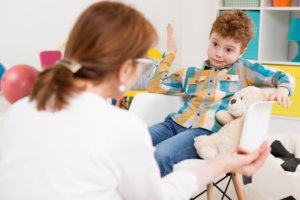When a Child is Rude to a Teacher: Consequences and Punishments

Sometimes our kids struggle with emotional regulation so much that they just can’t hold it together to be respectful – even to a teacher. One mom in Sanity School® asked us about this. How do we, as parents, respond when our kid is rude to a teacher? By discussing the difference between consequences and punishments, I helped her figure out how to respond when her son was rude to his teacher.
My Response:
1. Start with curiosity.
No, his behavior is not acceptable, but it will help you to understand it from a place of compassion. What might have made it hard for him to handle the situation in a respectful manner? Was he particularly stressed out by the situation? Put on the spot because the teacher was "calling him out" in front of others? Embarrassed or frustrated that he couldn't figure it out on his own? Triggered and completely shut down?
It is likely that several of these things were going on all at once. Can you have a conversation with him about it from a non-judgmental place? (Hint: don’t have this conversation when he’s triggered or when you are!) It might sound something like: "Hey buddy, the teacher told us about this incident. It seems so unlike you to be disrespectful at school. What happened this time that made it so different? Do you want to tell me about it?” (Note: his answer the first time you try something like this might be "I don't know.” That’s okay – be patient and try again in another situation.)
Your goal here is to identify, moving forward, what broader help he really needs. Does he need help to learn how to handle embarrassment? How to notice when he's triggered? How to handle it when an adult doesn't treat you with respect? It’s not enough to say, “always speak nicely to the teacher." Something else is going on. Get curious about what that might be.
Article continues below...
Want to Stop School Struggles?
Download a free tipsheet "10 Parenting Tips for School Success" to stop constant challenges at school and at home!
2. There’s a difference between consequences and punishments.
Consequences are agreed to (typically in advance) so that everyone is clear about what will result based on a particular behavior. This is great for parents because the agreement gets to be the ‘bad guy’, and parents get to stay in a compassionate place of support. It might sound something like: “Wow, I know you really wanted extra video time today, and unfortunately, the deal was you needed to have homework done by five. Bummer. I bet you can do it tomorrow. Do you want to work together to help you do that?”
A punishment, on the other hand, usually comes out of the blue as a way to penalize someone for a behavior that is deemed ‘bad.’ When something significant happens that is not expected – like a kid being rude to a teacher – it makes sense to discuss the event and collaborate on possible consequences rather than just punish a child outright. Note: often, kids are harder on themselves than we would be, so it’s important that the parent make the final determination. Punishment is not likely to change the behavior, especially for complex kids. But if a child is able to understand and take ownership of a mistake, they’re more likely to learn from it.
3. Keep the real goal of a consequence in mind.
As parents, we want a consequence to be:
- send a message about an unwanted behavior
- be a deterrent from the behavior happening again
With complex kids, when considering consequences and punishments for being rude to a teacher (or any reason), remember that the deterrent part doesn't work very well. Most kids with executive function challenges – or who are constantly triggered – are not able to learn from their mistakes or remember that they will get in trouble to avoid something in the future. Sometimes significant consequences actually backfire, leading kids into a self-defeated space, wondering, “Why should I bother to try, I'll never get it right...” When you establish a consequence, make sure it's measured. Focus your effort on helping them identify a wanted behavior instead of just avoiding an unwanted behavior.
Using the ACE Method to Communicate
If your child’s reaction to your conversation about being rude to a teacher is to blame the teacher, which is a typical triggered response, use the ACE Method to guide the conversation: Acknowledge their experience with Compassion (AC). Like, “Wow – sounds like you feel that she was totally unreasonable, and it made you really angry. Sometimes we say things we shouldn't when we get really upset... " Give them space to tell you more about what’s going on for them and to vent any emotions about the situation. Resist the urge to jump in.... UNTIL he seems calm about it.
Once he is calm, move on to the E in ACE: Explore. Maybe you would add a boundary or agree on a consequence. "It makes sense that you were upset, and you know it is NOT ok to talk with teachers the way that you did. How should we handle it? What do you think an appropriate consequence should be? How might you apologize to your teacher?"
Final Note
Check your own triggers. When you hear that your child is rude to a teacher, that will likely push your buttons. As you consider the merits of consequences and punishment, make sure you are really calm before you engage in the conversation at all.


